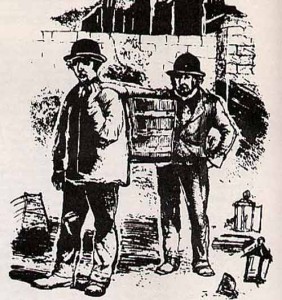Ashley Chaifetz, a PhD student studying public policy at UNC-Chapel Hill writes,
Whole Foods announced recently that they are banning produce grown with biosolids (also known as its less-friendly moniker, sewage sludge), which sounds pretty awesome. But it’s hard to know if the new rule makes their products safer. Biosolids are a fertilizer that comes from municipal waste. Treated human poop. Like composted animal manure, it’s seen as a way to enrich the soil. According to the U.S.  Environmental Protection Agency (EPA), sludge is used on less than 1% of agricultural land and promotes the growth of agricultural crops, gardens and parks.
Environmental Protection Agency (EPA), sludge is used on less than 1% of agricultural land and promotes the growth of agricultural crops, gardens and parks.
Sewage is full of whatever it is that people consume or flush and can sometimes include pharmaceuticals and heavy metals. But the abundant fertilizer mix is treated, through what EPA says are physical, chemical and biological processes to remove contaminants and solids. The sewage is then treated with lime to lessen the smell and it is all sanitized to control pathogens.
The EPA has 2 tiers of standards regarding sludge. The National Academy of Sciences has looked at the outputs and states “the use of these materials in the production of crops for human consumption when practiced in accordance with existing federal guidelines and regulations, presents negligible risk to the consumer, to crop production and to the environment.”
According to NPR’s The Salt, even Whole Foods doesn’t think the ban changes much.
Whole Foods spokeswoman Lindsay Robison tells The Salt that biosolids were banned in the name of transparency and being consistent with the U.S. Department of Agriculture’s National Organic Program, which doesn’t allow the material on fields where any certified organic product is grown. But, she adds, the company’s new biosolids ban won’t actually impact any of the company’s growers because, as far as the company knows, none of them use the material.
Some soil folks have weighed in on the ban, suggesting that Whole Food’s approach here is more about marketing and business decisions than food safety.
“This is a resource that’s really undervalued,” says Sally Brown, a soil scientist at the University of Washington who has been studying biosolids for over a decade. “If you do the carbon accounting, you see that biosolids actually capture carbon, unlike synthetic fertilizer, which is what farmers would otherwise be using.”
The opposition to biosolids comes from the fact that people are still uncomfortable with any material made from human waste, even if it’s been heavily processed and treated, Brown notes.
“People have been taught that poop is dangerous and it makes you sick, and so they’re suspicious of it,” she says. “And municipalities have done a terrible job of communicating what they do and what wastewater treatment really is.”
So where does the Whole Foods ban come in?
“Whole Foods,” says Brown, “made a business decision rather than a sustainability or environmentally based decision.”


